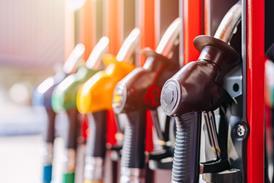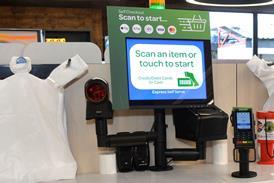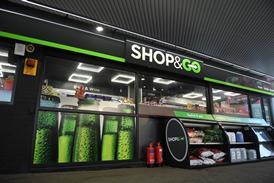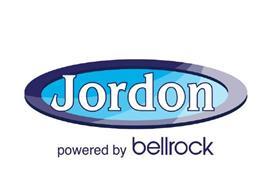Up to 40% of annual battery sales are made in the lead up to Christmas. For maximum sales, Tim Clark, sales manager UK and Ireland for Panasonic Energy, recommends that forecourt retailers prompt their customers to see if they need any extra batteries.
"A survey of 1,000 adults commissioned by Panasonic revealed that 75% of customers would welcome a prompt from a retailer to remind them to top up on batteries when making a grocery purchase," he says. The same survey found that one in four consumers had received a battery-operated gift, but no batteries. And 10% of those surveyed had also experienced a Christmas Day battery failure in an appliance such as a TV remote control, camcorder or computer game.
Energizer marketing manager, Emily Smith, says that like many products most batteries are sold through the grocery multiples, but she adds that nearly half of all battery buyers are governed by an immediate need like the remote control stopping working. "This means that location rather than type of retail outlet will influence the purchasing decision. This is reflected by the fact that 46% of shoppers buy batteries on impulse (Mintel data) and makes them an important category opportunity for all impulse channels," she says.
Each UK household now owns an average of 30 battery-powered devices, while 89% of households have at least one digital device (GfK data). Gaming is currently the fastest-growing area for battery-operated devices. Energizer makes much of the fact that its Ultimate Lithium is the longest-lasting AA and AAA battery it can last up to 60 hours in a Nintendo Wii remote control compared with just 35 hours with standard AA alkaline batteries.
Panasonic’s Smith says: "The trend towards more high-drain gadgets and in-home gaming is proving an excellent opportunity to boost battery sales."
Clark recommends that forecourts carry all five main sizes of battery AA, AAA, C, D and 9V as well as key fob cell batteries and AA and AAA ready-to-use rechargeables.
He reckons that many forecourt customers are less price sensitive than those in other outlets, however retailers who like to offer promotional stock can take advantage of Panasonic’s ’eight plus two free’ zinc battery pack as well as a ’four plus four free’ alkaline pack in the run up to Christmas. Both promotional packs are available in the company’s new shelf-ready packaging. Retailers simply take the top off the outer and put it on the counter to take advantage of impulse sales. Most forecourts display their batteries behind the counter for security reasons, however having a shelf-ready outer on the counter, right under the nose of staff, could really push those impulse sales.
But Vince Armitage, divisional vice president at Varta, recommends that retailers put their batteries out on the shop floor: "Given the fast turnover of transactions in a typical forecourt shop, many shoppers will feel intimidated to ask about batteries if they are behind a counter, feeling under pressure to make a choice because of the queue of people building up behind them both in the shop and on the forecourt. Therefore, forecourt retailers need to take batteries out from behind the counter and find a good location in store, ideally in the consumer’s eye line and at a juncture that they will pass when they enter the building and make their way to the counter. This is important as many battery purchases are made on impulse and due to this fact, retailers should also consider a secondary location, an approach that has been shown to increase sales."
Armitage also believes forecourts should think hard about their pricing. "Many forecourts are tempted to try and cash in on the impulse, often emergency nature of batteries bought in garages. But we would advise retailers to ensure their pricing is in line with the high street. Consumers now are savvier than ever they even have tools on their phones which allow them to compare prices in seconds and so, by not considering price points, forecourt retailers could find themselves priced out of the market, driving consumers to look elsewhere.
"Having adequate point-of-sale material and visible pricing information also plays a big part in the buying process. The majority of consumers are reluctant to ask about the price of goods if they can’t see it because they feel as if they are then committed to buy. As a result, they often walk away empty-handed. So, retailers should be pressurising the manufacturers whose products they stock for impactful and informative point of sale to help make the selling process even easier."
There’s no disputing that battery buying can be confusing. Cells look similar but the manufacturers are working hard to help consumers out.
Panasonic unveiled its new-look battery range earlier this year with changes specifically designed to make it easier for shoppers to choose the right battery for their needs. The main changes Panasonic made to the range were: name changes to simplify customer decision making; new colour and pack designs; icons to highlight battery usage; and the introduction of a medal ranking system to clarify product range hierarchy.
The medal system comprises Evoia Platinum; Pro Power Gold which has replaced Xtreme and is 10% longer lasting; Standard Power Silver which has replaced Essential and again is 10% longer lasting; and Alkaline Power Bronze.
Energizer is another brand that has revised its packaging design to include icons indicating which battery is most appropriate for which device. For example, the Energizer Ultra+ packs include icons depicting low-drain devices such as a clock or torch, while the Energizer Ultimate Lithium icons show high-tech devices such as gaming controllers and digital cameras.
As for innovation, it all seems to be happening at Duracell. Its Ultra Power has been given a performance upgrade backed by national TV, print and PR support. Then there’s the new Duracell Simply, an alkaline battery designed to offer Duracell quality for the value-conscious shopper.
Recommended retail price is £2.89 compared to £3.99 for Duracell Plus and £4.49 for Duracell Ultra Power.
It’s a good move because during the recession some shoppers switched from alkaline to zinc batteries. But Annaliese Reekie, Duracell business leader, says zinc carbon technology is an inferior chemistry to alkaline batteries and as such is a poor-value solution for the consumer. "However this is not widely known by consumers and Duracell continues to take steps to improve this understanding. Duracell alkaline batteries offer improved performance versus zinc technology and have much stronger environmental credentials."
Recharging ahead
Rechargeables are a growing part of the market, and definitely something forecourt operators should consider stocking if they are not already doing so.
To help boost sales and encourage new entrants into the category, Duracell launched a new range of chargers and cells earlier this year, supported by a multi-media marketing plan. On the cells side of the business Reekie says Duracell continues to drive growth with its Staycharged batteries, which retain up to 85% of their charge for up to a year when not in use.
She adds: "Our Minicharger and Easycharger have seen strong growth in the past year with great support from the trade and a positive consumer response following national print and PR campaigns."
For larger sites with high levels of footfall, Varta’s Armitage recommends retailers think about stocking chargers which offer the consumer power on the go. "Varta has developed a strong range of these in recent months, including the Backup Charger (rrp £14.99) for the emergency charging of portable devices such as mobile phones or sat navs.
Duracell has a range of portable chargers that can charge smartphones and mp3 players on the go Duracell Pocket Chargers (rrp £19.99), Duracell Instant USB Chargers (£29.99) and Duracell 2-in-1 Chargers (rrp £49.99). These devices can be charged from a laptop via a USB port. They then store power which can be used when you are on the go.
Meanwhile, the new Energizer Intelligent charger features a countdown clock that informs the user how many hours are left until the batteries are fully charged. In addition, it has a digital fuel gauge showing how full the batteries are.
Uniross has just launched its Essential range of pre-charged ready-to-use rechargeables. They can be recharged up to 1,000 times and are available in 4xAA, 4xAAA packs as well as a compact charger plus 4xAA pack. Prices start at £4.99 for the batteries and £9.99 for the charger kit.
Uniross reckons it supplies the most comprehensive range of battery chargers of any manufacturer.
Many of its chargers are also supplied with a car cord included for easy in-car use from the 12v supply. Uniross offers special forecourt charger promotional kits which include compact charger, 4xAA ready-to-use rechargeable batteries and a free car charger included.
And the company says its new range of Uniross EUP-compliant power adaptors is a first in the UK. These power adaptors and cables for home and car use minimise the power when in standby mode. Dedicated power adaptors are available for iphone/ipod users, mobile phone, games and laptops.
Lighting up sales
Finally, there are torches a natural item for a forecourt store to stock.
Uniross has launched LED technology across its torch range. The benefits are the bright white light, low power consumption and long life. Prices start at £3.99.
Finally Varta recommends that forecourt retailers consider stocking a product such as its Dynamo Light (rrp £11.99), a wind-up torch which offers 30 minutes of light from just one minute of winding.
Top 10 battery-powered devices - battery types
1 Remote control AAA, AA
2 Clock AAA, AA
3 Digital camera AAA, AA, specialist
4 Torch AAA, AA, C, D
5 Smoke alarm 9V
6 Watch specialist
7 Children’s toy AAA, AA, C, D, specialist
8 Personal music player AAA, specialist
9 Gaming console accessories AAA, AA
10 Nintendo Wii remote AA
Source: Mintel
recycling
New regulations on the recycling of batteries were introduced earlier this year. If you sell more than 32kg of batteries per year (about seven four-packs of AA batteries a week), you will need to take back used batteries from the public free of charge.
You must provide your customers with information about your take-back facility; accept all types of portable batteries not just the ones you sell; provide the take-back facility free of charge (that is, not require people to purchase goods from you in order to return used portable batteries).
Battery Compliance Schemes (BCS) collect the used batteries from your premises free of charge. Further information is available at www.defra.gov.uk

















No comments yet